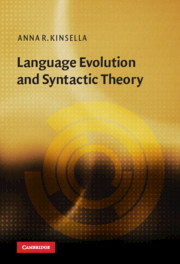Book contents
- Frontmatter
- Contents
- List of figures
- List of tables
- Preface
- List of abbreviations
- 1 Constraining our theory of language
- 2 Language as a perfect system
- 3 Language as an evolvable system
- 4 Language as a recursive system
- 5 Language as a minimal system
- 6 Towards an evolvable theory of syntax
- Bibliography
- Index
6 - Towards an evolvable theory of syntax
Published online by Cambridge University Press: 30 September 2009
- Frontmatter
- Contents
- List of figures
- List of tables
- Preface
- List of abbreviations
- 1 Constraining our theory of language
- 2 Language as a perfect system
- 3 Language as an evolvable system
- 4 Language as a recursive system
- 5 Language as a minimal system
- 6 Towards an evolvable theory of syntax
- Bibliography
- Index
Summary
Evolution as a constraint on theories of language
The central investigation of this book has been the evolutionary plausibility of the Minimalist Program. The preceding chapters have examined a number of ways in which that particular style of syntactic theorising fails to satisfy one constraint which we might place on our accounts of the language faculty – the constraint of evolvability. Any theory of language must be developed with a specific question in mind. Whether our concern is acquisition, processing, language variation, or indeed evolution, the construction of a theory of language must begin with some problem to be focused on. As the theory is underdetermined by the data, a theoretical focus must be employed to constrain the theory.
In this final chapter, the results of using evolvability as the constraining factor will be reviewed. That is, I will ask what types of features and processes this constraint entails for the language faculty; what would it mean for our theory of language to be not simply descriptively adequate and explanatorily adequate, but also evolutionarily adequate? The conclusions that have been reached in the preceding chapters will be drawn together to deduce a clear and logical rationale for rejecting the MP as a reasonable way to look at language. In the final sections, the prospects for other theories of syntax when evaluated against the same evolutionary criteria will be briefly examined.
What will an evolvable system of language look like?
The choice to pursue evolvability as a constraint on theories of language has resulted in the delineation of a system with a number of characteristic properties.
- Type
- Chapter
- Information
- Language Evolution and Syntactic Theory , pp. 185 - 194Publisher: Cambridge University PressPrint publication year: 2009



